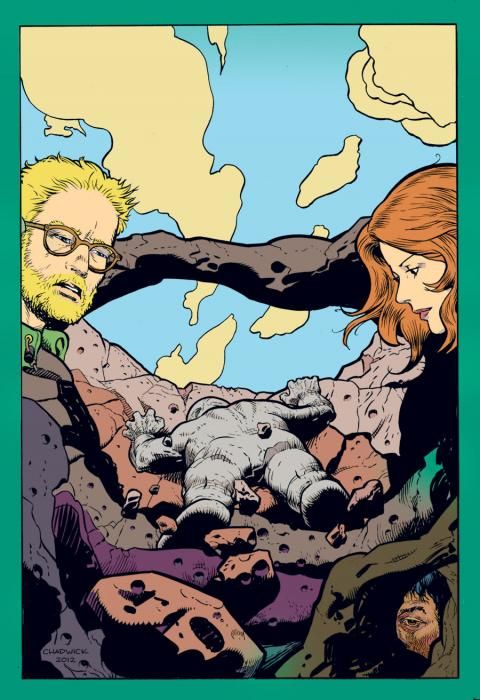"Concrete: Three Uneasy Pieces" collects three of Paul Chadwick's short pieces in "Dark Horse Presents v.2" #1-3, so if you have those issues, you could skip this. If not, however, this 24-page one-shot is definitely worth picking up, particularly if you are already a fan of "Concrete."
"Intersection" is a compressed mystery with quiet but suspenseful pacing. It's nice to see a crime story with a different kind of tone than usual hard-boiled stuff. Concrete's voice is always reflective and gentle even as he stumbles across some sordid violence. At the end of the tale, there is also an adorable cameo of Concrete's child, looking like a cross between rock thermos and a sleeping infant.
"In a Wound in the Earth" is rescue story and also the most metaphysical of the three pieces, dealing with how the human mind's need see patterns and connections to make sense of a chaotic world, and how fragile our needs can make us.
"Everything Looks Like a Nail" is the most political and paternalistic of the three stories. Both "Concrete" the title and Concrete the character are unusually well defined politically. This story can be read as an opinion piece against tasers. It's also a wider meditation on the use and abuse of force "when all you have is a hammer." Tangentially, it also brings up questions about the difficulty of pursuing better solutions when cheaper ones are available, and the conflict between conscience and a need for boundaries. The solution that Concrete finds to his self-created problem of duty vs. need is a delightful bit of unexpected whimsy.
Chadwick's art is steady and solid, blocky and heavy, yet often poetic, like Concrete himself. His style is understated, detailed, and easy to follow and digest. Chadwick's color work, with its pastel matte palette, is similarly easy on the eye His characters' facial expressions are evocative and his dialogue is natural. There is no bombast, no self-importance, no theatrics, but there is some philosophical heaviness.
Concrete is a unique hero, and "Concrete: Three Uneasy Pieces" is a collection that shows the Chadwick's range (mystery, travel, domestic suburbia), but also highlights his approach to story. In a review of Ursula K. Le Guin's novels and short stories, Margaret Atwood once wrote, "Sci-fi is sometimes just an excuse for dressed-up swashbuckling and kinky sex, but it can also provide a kit for examining the paradoxes and torments of what was once fondly referred to as the human condition." All the kingdoms and planets in Le Guin's stories are just a way to talk about our own world. Like Le Guin, Chadwick's concerns are anthropological rather than scientific, with a particular focus on individual human actors and their messy motivations. It's a continuous pleasure to see this kind of storytelling in comics.

